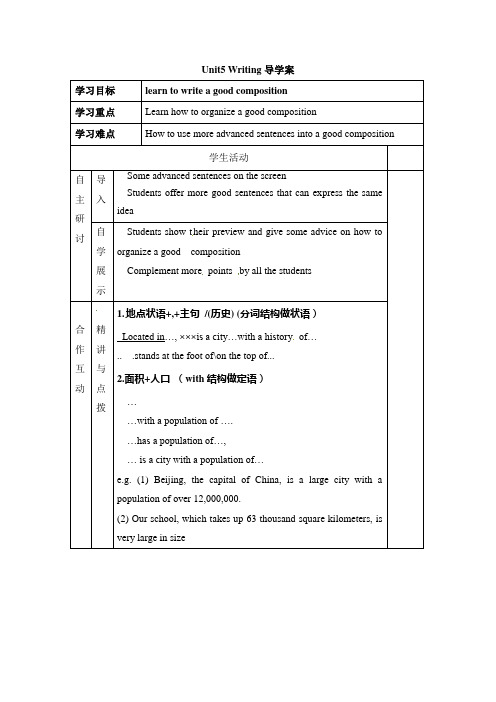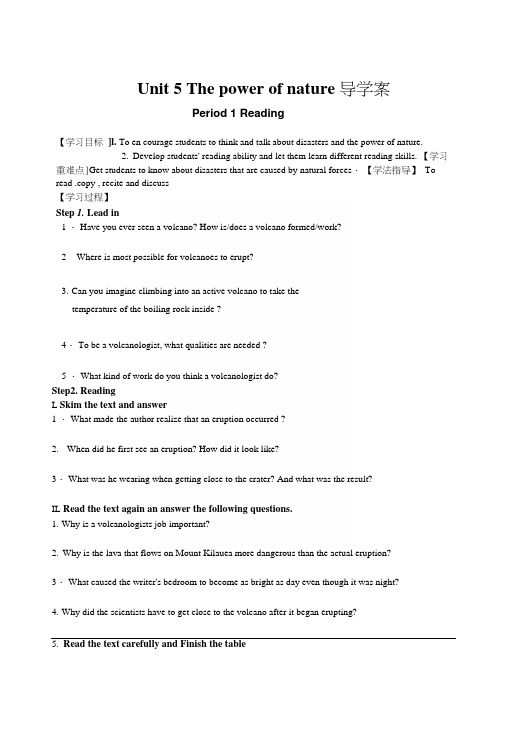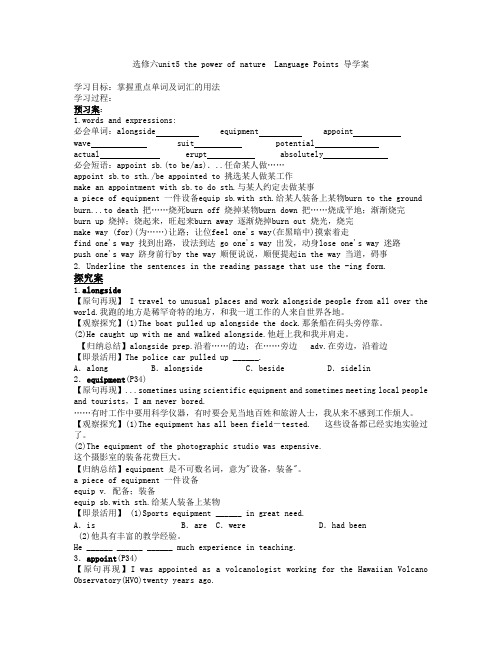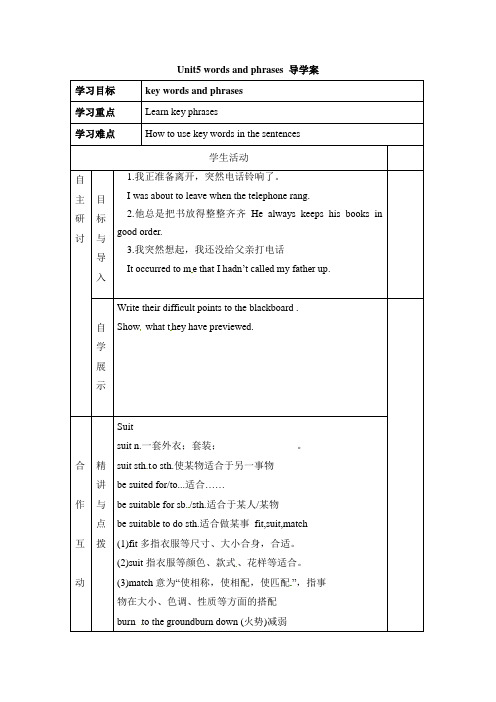高中英语选修六unit5导学案
人教版高中英语选修6 Unit5 Writing 导学案

3.可以步行上山,也可乘索道(ropeway)或缆车(cable car)。
Unit5 Writing导学案
学习目标
learn to write a good composition
学习重点
Learn how to organize a good composition
学习难点
How to use more advanced sentences into a good compHale Waihona Puke sition学生活动自
主
研
讨
导入
Some advanced sentences on the screen
Students offer more good sentences that can express the same idea
自学展示
Students show t heir preview and give some advice on how to organize a good composition
Complement more points by all the students
合
作
互
动
精讲与点拨
1. 地点状语+,+主句/(历史) (分词结构做状语)
Located in…, ×××is a city…with a history of…
.. .stands at the foot of\on the top of...
2.面积+人口(with结构做定语)
…
…with a population of ….
…has a population of…,
人教版新课标高中英语教学(选修6)xuan修6第5单元导学案.docx

Unit 5 The power of nature 导学案Period 1 Reading【学习目标]l. To en courage students to think and talk about disasters and the power of nature.2.Develop students' reading ability and let them learn different reading skills. 【学习重难点]Get students to know about disasters that are caused by natural forces・【学法指导】To read .copy , recite and discuss【学习过程】Step 1. Lead in1・ Have you ever seen a volcano? How is/does a volcano formed/work?2Where is most possible for volcanoes to erupt?3.Can you imagine climbing into an active volcano to take thetemperature of the boiling rock inside ?4・ To be a volcanologist, what qualities are needed ?5 ・ What kind of work do you think a volcanologist do?Step2. ReadingL Skim the text and answer1 ・ What made the author realize that an eruption occurred ?2.When did he first see an eruption? How did it look like?3・ What was he wearing when getting close to the crater? And what was the result?IL Read the text again an answer the following questions.1.Why is a volcanologists job important?2.Why is the lava that flows on Mount Kilauea more dangerous than the actual eruption?3・ What caused the writer's bedroom to become as bright as day even though it was night?4.Why did the scientists have to get close to the volcano after it began erupting?5.Read the text carefully and Finish the tablethe general description of myjob ♦I Travels to (1) places and work with people from all over the world.♦Mv iob is (2) dangerous.♦Mv iob is to collect information for a(an) (3) about Mount Kilauea to help predict where lava from the volcano will flow next and how fast.♦Our work has (4) manv lives because people in the bathof lava can be warned to leave their houses・the damage of volcaniceruption ♦The lava that flows (5) the mountain causes great damage because it buried everything in its (6) under the molten rock.my first experience of the volcanic eruption ♦I was fast asleep when suddenly mv bed began (7)♦I heard a strange sound like a(an) (8) passing mv window.♦Then my bedroom became as bright as(9) ・♦There had been a(n) (10) from the side of Mount Kilaueas and red hot lava was (11) hundreds of metres into the air.my first experience of the volcanic eruption ♦It was an absolutely fantastic 仃2)♦The next day two other scientists and I were driven up the mountain for a closer (13) at it.♦We put on special clothes and slowly (14) to the edge of the crater・♦I stayed at the top and watched them while the other two scientists (15) into the crater to collect some lava for later study.Step3 Extensive readingL Reading and writing : The lake of heavenRead the passage and fill in the tableChangbaishan Position In Jilin Province.Height 1from 700 metres above sea level to over2Changbaishan Attraction ▲Manv people come to study the 3 plants andanimals.▲Others come to walk in the mountains, to see thespectacular 4 or to 5 in the hotwater pools.Attraction6 ▲It has formed in the crater of a dead volcano on7 of Changbaishan.▲It's 2,194 metres above sea level and more than 200 metres 8 ・▲Views are the 9 waters and sixteen mountain peaks that 10 it.II.Reading the text again and tell the statements are true or false:1.Changbaishan is the second largest nature reserve in China.2.The peak of Changbaishan can reach as high as 2,000 meters.3.You see a lot of black bears, leopards or cranes in Changbaishan.4.Tianchi is a lake in the crater of an extinct volcano.5.The ancestors of the Manchu people were believed to be good at language and persuasion. Step4.理解下列长难句1.Having collected and evaluated the information, I help other scientists to predict where lava from the volcano will flow next and how fast.句子结构分析:having collected and evaluated是动词・ing形式的_______ 式,说明它表示的动作在主要谓语表示的动作之—发生。
【原创】选修六Unit5 The power of nature学案

高中英语选修六Unit5The power of nature导学案课题:Unit5 Reading学习目标:略一、复习指导:复习本单元单词及自然灾害的表达二、课中探究单:完成以下阅读任务Task1: Read para1-2 carefully and answer the fowling questions1. Why does the writer say that he has the greatest job in the world?2. Why is a volcanologist’s job important?3. Where is Mount Kilauea?Task2: Read para3-4 carefully and answer the fowling questions4. Why is the lava that flows on Mount Kilauea more dangerous than theactual eruption?5. What caused the writer’s bedroom to become as bright as day eventhough it was night?6. Why did the scientists have to get close to the volcano after it beganerupting?7. Why was it difficult for the writer to walk towards the edge of the crater?Task3: Read para5 carefully and answer the questionWhat does the writer find impressive about volcanoes even after studyingthem for many years?Task4: Skim the text and get the main idea of the text.The writer expressed his _____ for his job as a ____________ and told us one of his unusual ___________in Mount Kilauea, Hawaii.Task5(summary): I have the ________ job in the world. I am never _____ with it. Although it is occasionally dangerous, I don’t mind because danger ______ me and makes me feel ____. I think my job is the most __________ because I can help _______ people from danger of volcanoes.I am a ___________ working for HVO. Our work has ______ many lives but unfortunately we can not save their _______. I have ___________ a volcano eruption in Hawaii. I was ____ asleep when my bed began _______ and I heard a _______ sound, like a _____ passing nearby. Then I found my bedroom was as ______ as day, and red lava was ___________ hundreds of meters into the air. The next day, three of us wanted to get close to the ______. We put on _________ suits, ________, big _______ and special ______, which made us look like __________. We slowly _____________ to the edge of the crater to collect some _____ for __________. After studying volcanoes for many years, I am just as ___________ about my job as before. Why? Because of their ________ and their _________ to cause great damage.。
选修六unit5 the power of nature Language Points 导学案

选修六unit5 the power of nature Language Points 导学案学习目标:掌握重点单词及词汇的用法学习过程:预习案:1.words and expressions:必会单词:alongside equipment appointwave suit potentialactual erupt absolutely必会短语:appoint sb.(to be/as)...任命某人做……appoint sb.to sth./be appointed to 挑选某人做某工作make an appointment with sb.to do sth.与某人约定去做某事a piece of equipment 一件设备equip sb.with sth.给某人装备上某物burn to the ground burn...to death 把……烧死burn off 烧掉某物burn down 把……烧成平地;渐渐烧完burn up 烧掉;烧起来,旺起来burn away 逐渐烧掉burn out 烧光,烧完make way (for)(为……)让路;让位feel one's way(在黑暗中)摸索着走find one's way 找到出路,设法到达 go one's way 出发,动身lose one's way 迷路push one's way 跻身前行by the way 顺便说说,顺便提起in the way 当道,碍事2. Underline the sentences in the reading passage that use the -ing form.探究案1.alongside【原句再现】 I travel to unusual places and work alongside people from all over the world.我跑的地方是稀罕奇特的地方,和我一道工作的人来自世界各地。
人教版高中英语选修六第五单元复习导学案

我被指派经营海外部。(朗文)
归纳拓展:
①a suit of一套/副
②suit sb.(fine)(很)合某人的意;对某人(很)合适
③suit...to...使(某物)适合于……
④be suited to/for适合……
_________________________________________________________________________________________
8. He _____________________(委派)work for the United Nations. (appoint)
9. I had better hurry, for I _______________________(约定) him at 10:00a.m. (appointment)
⑤suitable adj.适当的;相配的
⑥be suitable for sb./sth.适合于某人/某物
⑦be suitable to do sth.适合做某事
①appoint sb.as/to_be...任命某人为……
②appoint sb.to_do sth.委派某人做某事
③appoint sth.(for sth.)(为某事)确定(日期、场所)
Teaching methods vary greatly from school to school.
各个学校的教学方法大不相同。(朗文)
归纳拓展:①vary in sth.(大小、形状等)不同/有别
②vary with随……变化/改变③vary between...and...从……到……转变
人教版高中英语选修6 Unit5 words and phrases 导学案

Unit5 words and phrases 导学案e that I hadn’t called my father up. Show what t hey have previewed.Suitsuit n.一套外衣;套装;。
suit sth.to sth.使某物适合于另一事物be suited for/to...适合be suitable for sb./sth.适合于某人/某物be suitable to do sth.适合做某事fit,suit,match(1)fit多指衣服等尺寸、大小合身,合适。
(2)suit指衣服等颜色、款式、花样等适合。
(3)match意为“使相称,使相配,使匹配”,指事物在大小、色调、性质等方面的搭配burn to the groundburn down (火势)减弱burn sth.down (将某物)焚为平地;烧得精光burn sth.off烧掉某物burn (itself) out (指火)因燃料用尽而熄灭、烧尽burn sth.out(因过热或使用过多)出故障burn onesel f out精疲力竭;累垮burn sth.out把……烧成空架子appointappointappoint sb.to sth.appoint sb.as...appoint sb.to do sth.appo int sth.(for sth.)anxiousbe anxious to do sth.be anxious for sb. to do sth.急于让某人做……be anxious that...急切希望……(that从句用虚拟语气should+v.,其中should(2)anxiety n.with anxietyanxiously adv.焦虑地make one’s way feel one’s way摸索着前行lose one’s way迷路work one’s way自始至终,从头至尾fight/push one’s way推/挤着前行wind one’s way蜿蜒向前force one’s way out挤出去;冲出去push one’s way in挤进去(1)看,很多孩子正往海滩走去。
高中英语选修六unit5导学案
选修6 Unit5 The power of naturePeriod 5 Using languageTeaching aims: To understand the usage of the key words and expressionsDevelop the students’ reading ability.Teaching methods: Task-based learning , Cooperative learning, DiscussionEmotion aims:Stimulate students’ interest in learning English自主预习:1. n.候选人;候补者2. adj. 贵重的;珍贵的→adv.贵重地;珍贵地3. adj. 不舒服的;不舒适的→adj.舒服的;舒适的→n.&vt.舒服;舒适;安慰4. →adj.失去知觉的;未察觉的→adv.失去知觉地→adj.有知觉的,有意识的5. adj.忧虑的;不安的→n.忧虑6. vt.保证;担保7. 匆匆看一遍8. from...to... 由……到……不等Reading partRead the passage on P39 and choose the best answers.1. is China’s largest nature reserve.A.Shaolin TempleB.ChangbaishanC.TianshanD.Shihezi2.Tianchi has formed on top of the mountain.A.during the earthquakeB.during the hurricaneC.during the stormD.in the crater of a dead volcano3.You are advised to drop into the clear blue water to guarantee your love will be as deep and lasting as the lake itself. A.a key B.a coinC.a flowerD.a lockTrue 0r false1.Changbaishan is the second largest nature reserve in China. ()2.The peak of Changbaishan can reach as high as 2,000 meters. ()3.You can see a lot of black bears,leopards or cranes in Changbaishan. ()4.Tianchi is a lake in the crater of an extinct volcano. ()5.The ancestors of the Manchu people were believed to be good at language and persuasion. ()Key words:1.diversity n. adj. ______________ v._______________翻译:多种多样的文化_____________________________多种多样的稀有动植物_______________________________不同的意见________________________________We should get a thorough understanding about the cultural diversity of the United States.我们应该对美国文化的多样性有一个全面的了解。
人教版高中英语选修六unit5导学案
高二英语导学案Unit 5 The Power of Nature课标要求:1。
话题:volcanoes and the work of volcanologists1. 词汇,词组,句型2。
功能:情感:喜悦,恐惧,焦虑,惊奇3。
语法:复习-ing形式。
内容概述:本单元的中心话题是火山,飓风,地震和洪水等自然灾害。
本单元引导学生讨论这些问题,目的在于让他们了解自然的威力,认识到人类只有保护自然,才能有效地预防自然灾害并改造和利用自然。
教学重点:1.了解火山,飓风,地震和洪水等自然灾害,并认识到人类只有保护自然,才能有效地预防自然灾害.2.学习有关火山,飓风,地震和洪水等自然灾害的词汇。
3.学会表达喜悦,恐惧,焦虑和惊奇等情感的日常交际用语.4.进一步巩固动词ING形式作状语的用法。
5.学习描述一种自然灾害。
课时安排:Periods needed:7Period 1 Warming up,Pre-readingPeriod 2 Reading and ComprehendingPeriod 3 Language StudyPeriod 4 GrammarPeriod 5 Using languagePeriod 6 WritingPeriod 7 Summing upPeriod 1 Warming up,Pre-reading课型:热身,预读知识要点:1.重点单词和短语:diagram,volcano, erupt, eruption, ash, hurricane, questionnaire,equipment,appoint,evaluate,wave,fountain,absolutely, suit;compared with, erupt into/in,burn to the ground, make one’s way to2.To learn about some facts and views about volcano erupting。
选修六第五单元词汇导学案
Unit5 The power of nature 编制人:李慧【学习目标】知识与技能:能正确理解和运用重要的单词(appoint\anxious\panic\guarantee\vary)和短语(burn to the ground\make one’s way)过程与方法:通过学生自主学习及小组合作探究的形式,掌握重点单词短语的用法.情感、态度与价值观:陶冶学生学习单词的热情。
【自主学习】根据提示,写出所缺单词的正确形式1. The company decided to a a new manager.2. The school has only been open for 6 months, so it’s too early to e it’s success.3. We him arms.我们把他武装起来了。
变为被动句:Divers had to buy much diving (equip).4. The e of volcano makes many people lose lives.5. She was the first to realize the (潜在的) danger of their situation.He is a young player with great (潜能) for sporting.6. At this stage the plan was (绝对地) secret.7. To show our (感激) for all your hard work, we’d like to give you a bow.I don’t appreciate (be) treated like that.if you paid in cash.如果你支付现金,我将不胜感激。
8. My husband, who is to me, sent me a lot of p gifts.9. She has been (无意识) for several minutes. Gradually, she’s (神志清楚) with the help of doctors.10. Police (射中) one suspect after a (枪声).11. I’m not the youngest (候选人), but I am the most experienced.12. There were roses in tubs on the b .13. I felt u when I had to admit my guilty.14. Let me see all the official (文件) concerning the sale of this land.15. It’s difficult to find a time that suits (意为) everybody.He tried to his performance the audience.他尽力使自己的表演适合观众的口味。
高中英语选修6Unit5 Part 5导学案
Unit5 The power of nature(Part 5 : Writing 说明文的写法导学案)Name _____________ Class______________【学习目标】①Enable the students to know the way of writing descriptive writing②Try to write a descriptive writing【写作指导】一、说明文的含义说明文是用来说明事物、阐述事理的一种文体。
二、说明文写作的要素1.抓住事物的特征,安排好说明顺序,可以按时间顺序、空间顺序或逻辑顺序,让读者一目了然2.说明文写作时要做到条理清晰、层次分明、语言简练、用词准确。
3.文章只是客观地介绍、解释事物,不带任何感情色彩,不需要生动的例证和解释细节。
4.文章的时态通常是一般现在时,用于强调客观事实,被动语态也比较常见。
5.篇章结构方面,开头一般对事物进行简要介绍;主体部分按一定顺序进行说明,注意语言要客观而简洁;结尾用一两句收尾,表示说明到此为止。
三、说明文中常用词和短语1)表示顺序、动作过程: first, firstly, first of all, secondly, at last, next等;2)表示转折:but, yet, however, otherwise, in spite of等;3)表示强调:above all, surely, of course, at most, at least 等;4)表示解释和说明:that is to say, for example, and so on, such as, according to this 等;5)表示比较、对比:just like that, more or less, on the contrary, on the other hand, in the same way 等;6)表示总结:finally, in conclusion, in a word, generally speaking, in short, in the end 等。
- 1、下载文档前请自行甄别文档内容的完整性,平台不提供额外的编辑、内容补充、找答案等附加服务。
- 2、"仅部分预览"的文档,不可在线预览部分如存在完整性等问题,可反馈申请退款(可完整预览的文档不适用该条件!)。
- 3、如文档侵犯您的权益,请联系客服反馈,我们会尽快为您处理(人工客服工作时间:9:00-18:30)。
高二英语导学案Unit 5 The Power of NaturePeriod 1 Warming up, Pre-reading课型:热身,预读知识要点:1.重点单词和短语:diagram, volcano, erupt, eruption, ash, hurricane, questionnaire,equipment, appoint, evaluate, wave, fountain, absolutely, suit; compared with, erupt into/in, burn to the ground, make one’s way to2.To learn about some facts and views about volcano erupting.Step 1 Warming up:Look at the diagram on the right on Page 33. It shows a volcano erupting.(a list of natural disasters: such as earthquake, snowstorm, flood, drought)(Some new words: volcano, volcanology, volcanologist, erupt, eruption, ash, crater, lava. hurricane, Magma chamber, dormant, extinct volcanoes, ……)Step 2 Pre-readingCan you imagine climbing into a live volcano in order to measure the temperature of the boiling rock inside? Can you imagine doing such dangerous work as part of your job? (Questionnaire on Page 33)Step 3 Reading and comprehending1. Fast reading:Ask students to skim the passage so as to get the key words and general idea of each paragraph and answer the question: What’s the main idea of the text?2. Read the passage carefully and answer the following questions.(1) What is the writer?(2) When did he first see an eruption? How did it look like?(3) What was he wearing when getting close to the crater? And what was the result?Step 4 Language Study重点单词:重点短语:重点句式:railway train passing my window.2. The other two climbed down into the crater to collect some lava for later study, but thisStep 5 Homework: Page 35 exercise 1Period 2 Reading and Comprehending课型:阅读课学习目的: 1 训练阅读技巧,培养快速阅读,猜词,找中心句的能力。
2 掌握部分知识点。
3 几个复合句的理解教学过程:Step 1 Lead-inStep 2: Fast reading: Read the passage An Exciting Job as quickly as you can and try to get the main idea of the passage.What is the main idea of the passage?A. An eruption occurred in Hawaii.B. A volcanologist’s job is exciting.C. A volcanologist’s exciting job and his first sight of an eruption.D. A sight of an eruption is horrible.Step 3: Detailed reading:1. Reading the first and the second paragraphs and finish the following tasks.1). Why is a volcanologist’s job important?2). The writer doesn’t mind the occasional danger of his job because .A. he travels to unusual places and meets interesting people from all over the world.B. he thinks his job the most importantC. he likes the different ways of workingD. he is excited about danger and feels alive.3). As a result of the vocanologist’s job,A. other scientists predict the progress of lava from the volcanoB. many people have been warned to leave their homes.C. the eruption causes less damageD. the eruption may be prevented from breaking out2. Read the third and the fourth paragraphs and finish the following tasks.1). What does the writer mean by using “lucky” in the sentence “I was lucky enough to have a much closer look at it”?A. He felt much safer on the top while the other two scientists climbed into the crater.B. It was his first sight of an eruption.C. It was the first time for him to watch the crater.D. Both B and C.Step 4: Searching reading:1. I am still amazed at their beauty as well as their potential to cause great damage. “Potential”means:A. possibilityB. opportunity2. Translate the following sentence into Chinese.Having studied volcanoes now for many years, I am still amazed at their beauty as well s their potential to cause great damage.Step 5 Homework:完成第36页的1,2练习。
Period 3 Language Study课型:语言点学习课程目标:学习阅读部分重点难点单词,短语和句型。
教学过程:重点知识点梳理及巩固:1.volcano n. pl. volcanoes活火山an active volcano死火山an extinct volcano休眠火山 a dormant volcano火山学volcanology火山学家volcanologist2. erupt v.1)(火山)爆发,喷发维苏威火山已经多年没有爆发了。
Mount Vesuvius _____ _______ for a good many years。
2)(搏斗,暴力事件,噪音等)突然发生,爆发街头暴力可以在没有明显原因的情况下爆发。
Violence in street can erupt for no apparent reason.erupt into laughter/shouting/crying, etc.突然大笑/叫喊/大哭他毫无理由地大笑起来。
He _______ _______ _______ without any reason3.equipment n. 设备,装备(不可数名词)a piece of equipment 一台设备equip v. 配备:装备equip sb/sth with sth 用。
装备起来/ 使具备。
the boy _________ _____________ ___________ food and water and then set off.孩子们配备好食物和水就出发了。
4 appoint v 任命,委派,安排,确定(时间,地点)appointment n. 约会,委派appoint sb as/to be….. 任命某人为。
appoint sb to do sth 委派某人做某事appoint a time/place for sth./to do sth 确定时间,地点做某事he ______ ______ _______chairman. 他被任命为主席Miss wang ______ ______ ______in the library. 王小姐被委派到图书馆工作。
Please ______ _______ _______ the meeting. 请安排开会时间。
5 Having collected and evaluated the information, I help other scientists to predict wherelava from the volcano will flow next and how fast it will flow。
